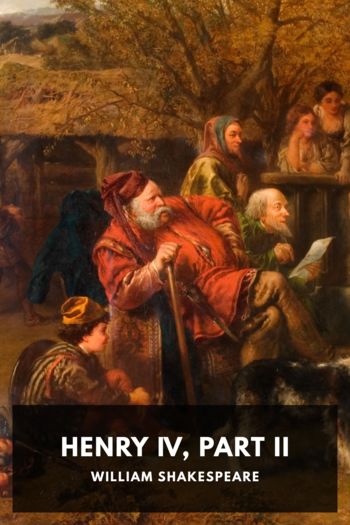Henry IV, Part II, William Shakespeare [love letters to the dead txt] 📗

- Author: William Shakespeare
Book online «Henry IV, Part II, William Shakespeare [love letters to the dead txt] 📗». Author William Shakespeare
I am assured, if I be measured rightly,
Your majesty hath no just cause to hate me.
No!
How might a prince of my great hopes forget
So great indignities you laid upon me?
What! rate, rebuke, and roughly send to prison
The immediate heir of England! Was this easy?
May this be wash’d in Lethe, and forgotten?
I then did use the person of your father;
The image of his power lay then in me:
And, in the administration of his law,
Whiles I was busy for the commonwealth,
Your highness pleased to forget my place,
The majesty and power of law and justice,
The image of the king whom I presented,
And struck me in my very seat of judgment;
Whereon, as an offender to your father,
I gave bold way to my authority
And did commit you. If the deed were ill,
Be you contented, wearing now the garland,
To have a son set your decrees at nought,
To pluck down justice from your awful bench,
To trip the course of law and blunt the sword
That guards the peace and safety of your person;
Nay, more, to spurn at your most royal image
And mock your workings in a second body.
Question your royal thoughts, make the case yours;
Be now the father and propose a son,
Hear your own dignity so much profaned,
See your most dreadful laws so loosely slighted,
Behold yourself so by a son disdain’d;
And then imagine me taking your part
And in your power soft silencing your son:
After this cold considerance, sentence me;
And, as you are a king, speak in your state
What I have done that misbecame my place,
My person, or my liege’s sovereignty.
You are right, justice, and you weigh this well;
Therefore still bear the balance and the sword:
And I do wish your honours may increase,
Till you do live to see a son of mine
Offend you and obey you, as I did.
So shall I live to speak my father’s words:
“Happy am I, that have a man so bold,
That dares do justice on my proper son;
And not less happy, having such a son,
That would deliver up his greatness so
Into the hands of justice.” You did commit me:
For which, I do commit into your hand
The unstained sword that you have used to bear;
With this remembrance, that you use the same
With the like bold, just and impartial spirit
As you have done ’gainst me. There is my hand.
You shall be as a father to my youth:
My voice shall sound as you do prompt mine ear,
And I will stoop and humble my intents
To your well-practised wise directions.
And, princes all, believe me, I beseech you;
My father is gone wild into his grave,
For in his tomb lie my affections;
And with his spirit sadly I survive,
To mock the expectation of the world,
To frustrate prophecies and to raze out
Rotten opinion, who hath writ me down
After my seeming. The tide of blood in me
Hath proudly flow’d in vanity till now:
Now doth it turn and ebb back to the sea,
Where it shall mingle with the state of floods
And flow henceforth in formal majesty.
Now call we our high court of parliament:
And let us choose such limbs of noble counsel,
That the great body of our state may go
In equal rank with the best govern’d nation;
That war, or peace, or both at once, may be
As things acquainted and familiar to us;
In which you, father, shall have foremost hand.
Our coronation done, we will accite,
As I before remember’d, all our state:
And, God consigning to my good intents,
No prince nor peer shall have just cause to say,
God shorten Harry’s happy life one day! Exeunt.
Gloucestershire. Shallow’s orchard.
Enter Falstaff, Shallow, Silence, Davy, Bardolph, and the Page. Shallow Nay, you shall see my orchard, where, in an arbour, we will eat a last year’s pippin of my own graffing, with a dish of caraways, and so forth: come, cousin Silence: and then to bed. Falstaff ’Fore God, you have here a goodly dwelling and a rich. Shallow Barren, barren, barren; beggars all, beggars all, Sir John: marry, good air. Spread, Davy; spread, Davy: well said, Davy. Falstaff This Davy serves you for good uses; he is your serving-man and your husband. Shallow A good varlet, a good varlet, a very good varlet, Sir John: by the mass, I have drunk too much sack at supper: a good varlet. Now sit down, now sit down: come, cousin. SilenceAh, sirrah! quoth-a, we shall
Do nothing but eat, and make good cheer, singing
And praise God for the merry year;
When flesh is cheap and females dear,
And lusty lads roam here and there
So merrily,
And ever among so merrily.
Be merry, be merry, my wife has all; singing
For women are shrews, both short and tall:
’Tis merry in hall when beards wag all,
And welcome merry Shrove-tide.
Be merry, be merry.
A cup of wine that’s brisk and fine, singing
And drink unto the leman mine;
And a merry heart lives long-a.
Fill the cup, and let it come; singing
I’ll pledge you a mile to the bottom.





Comments (0)